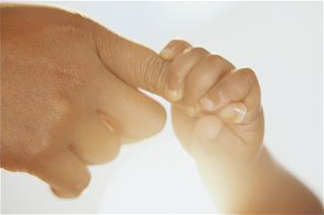
Mom has Parkinson’s disease. So, when she reaches her hand across her chest to rest it on my forehead, it is stiff and shaking. But what does it matter? Her caress comes from some instinct deep inside.
It’s Tuesday and I’ve come to see her, hoping to provide some company and comfort. But my head begins to throb and a migraine threatens to shorten my stay. Sitting in the chair across from her, I impulsively get up and sit on the floor next to mom’s recliner, leaning my head against her frail shoulder.
“My head hurts,” I say, more to myself than anyone else. Suddenly, unexpectedly, she leans over and touches my forehead. I can tell she is trying to stroke away the pain, the way she did when I was little. Her hand shakes, jerking back and forth, unable to rest in any one spot. But her fingers are light and I recognize the gesture.
It has been a long time since she has touched me this way. In that moment, the memories of the past year, tense with uncertainty and helplessness, begin to fade and the long ago comfort of her mother’s love comes flooding back. You see, we’ve been doing all the loving this year. With the accelerating dementia that often accompanies Parkinson’s, mom’s world has become an unfamiliar and sometimes frightening place. It’s been our job to help her through it.
Mom fell and broke her hip last August and the ensuing months have been a roller coaster of rehabilitation and decline. The surgery was hard on her, mentally and physically, and the rehab has been equally so. But now, as she reclines in her chair, unable to even sit up on her own, something besides pain and confusion surfaces. It is the need to comfort her child.
I’m a mother myself and understand this need. I also know being a mother is no easy job. Some of us love and have been loved deeply and well, while some of us struggle with our mothers. There are some women who seem unable to show love to their children, at least for any length of time. Maybe the scars they carry from their own childhood block the good impulses. Sometimes, when this happens and things are really broken, God sends us other women to “mother” us. That’s ok too. But whether or not she has been able to live it out, the moment you were born, you were imprinted on your mother’s heart. That is God’s design. No matter where she is in life, inside her is some deep place where her love for her children resides—even if you haven’t seen or felt it for awhile.
So whether this Mother’s Day is a time when you celebrate your mother, or forgive her, or let your secret wishes for her go, it is hopeful to realize that mothers are designed to love, even when they can’t quite remember who they are.
“Oh, that feels so good, mom,” I tell her as she brushes her fingers across my forehead. “My headache is getting better already.” Funny, but I actually think the pain is diminishing some. “It is?” she whispers, surprised that her power to heal is still present. Sometimes all it takes is a simple moment to erase the hard times. She smiles, pleased that she can give back. When I leave, I silently thank God for this new memory to carry in my heart during whatever comes next for us. That’s when I r